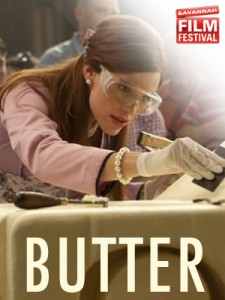 There are a ton of problems with Jim Field Smith’s Butter –so many in fact that it’s no stretch to say that it’s pretty bad– but there’s a bit of a dilemma in just how sharp and funny it manages to be regardless. An occasionally uproarious satire/drama about butter carving, through all its effective humor the film attempts to comment on a ton of ideas from the false concept of an idyllic Middle America, race relations, politics, and art.
There are a ton of problems with Jim Field Smith’s Butter –so many in fact that it’s no stretch to say that it’s pretty bad– but there’s a bit of a dilemma in just how sharp and funny it manages to be regardless. An occasionally uproarious satire/drama about butter carving, through all its effective humor the film attempts to comment on a ton of ideas from the false concept of an idyllic Middle America, race relations, politics, and art.
It manages to say something worthwhile about exactly none of them.
There’s no doubt the script is a trainwreck of poorly constructed conflict and character building, but it’s so confidently shot and performed that you don’t even realize how senseless it all is until it’s nearly over! Let me explain.
The plot of Butter is essentially bifurcated between the stories of Laura Pickler (Garner) and Destiny (the adorable Yara Shahidi), two very different individuals that are both brought into the world of competitive butter sculpting by odd circumstances. For Laura, it is that her champion butter-carving husband is being asked to step out of the spotlight, which threatens the Stepford Wives-like sway she holds over the local community. With no plans on “gracefully stepping down” as the first family of her midwestern town, she takes matter into her own hands and learns to be a butter artist. I should probably let it out now that the script and Garner are pretty heavily riffing on Sarah Palin here, though not so obviously as with an accent or the cartoonish buffoonery of the real-life political figure. Destiny on the other hand, is an orphaned 11-year-old black girl who can’t manage to find a foster home where her guardians aren’t drug dealers or old people on the brink of death. She finally ends up with the Emmets (Rob Corddry and Alicia Silverstone) who are the super-cool progressive white people whose sanity and selfless support of Destiny sharply contrasts the dysfunction of the red-state Pickler family.
Everyone takes on their roles superbly, and it’d be classic ensemble were all of these characters not written with a profoundly smug and disingenuous sense of character motivation. The screenplay makes it very clear from the start which characters the writers favor and which of them they look down on. There’s an old acting trope that you can’t perform a character if you’re judging them, and the same is true for screenplays. While villains can certainly be shameless and without the usual dimension we expect from main characters, you can’t devote half of your movie to a woman you clearly have no empathy for, meanwhile contrasting her with the oh-so-precious hyper-intelligent child. It’s a bizarre setup that robs the film of any balance and dissolves all possible conflict before it even begins. You might think that as these two main characters square off towards the end of the film that they’d each have been loaded with enough layers that you’d be at least a touch conflicted about who you’d like to see succeed. Nope! The film takes a side from the get-go, piles on the villainy coming from what is ostensibly the film’s protagonist, and then offers no surprises at the climax. There’s lip-service given to someone learning a lesson, but it’s so couched in unearned sentimentality that it’s worthless. You can’t decide to suddenly to add a second dimension to your cartoon just because the film has to end in a few minutes.
But here’s the rub of the whole thing: everyone from Jennifer Garner to Rob Cordry to Olivia Wilde to an out-of-nowhere Hugh Jackman are all 100% energized and game for every one-liner and pieces of slapstick comedy the film throws at them. Beyond just the performances is direction from Jim Field Smith that has an excellent handling on comedic timing, pacing, clever shot design and employs camera work much stronger than what you often see in a comedy, but it’s all in service of something aggressive contrived. Characters like Wilde’s hilarious hooker and Jackman’s silly redneck are all charming, but they add little to the narrative beyond general quirkiness. Hell the pickler family even spots a resentful daughter who inhabits a C-plot (really, more of a J or K-plot) revolving around a meaningless lesbian tryst, which the film fails to pay off in any way that justifies the (admittedly tame) lesbian sex earlier in the film. I’m sure that footage will look great in a trailer though!
As satisfying for Jason A. Micallef as it must have been to stick it to a political cartoon character (an instinct with which I sympathize) and to lampoon the social politics of Middle America, that requires actual character work and finding a human side to people you might not actually like or agree with. Writing an overwrought (blacklisted!) screenplay that plays out with no tension or surprise isn’t the path to satire, it’s just masturbation. That said, the potency of the script may have been diluted at some point in the process, so perhaps the blame is not to be laid solely at Micallef’s feet. In any event, a more-than-watchable movie plays out due to the game efforts of everyone else behind or in front of the camera, but it’s baffling that no one realized so much work was going into something so disingenuous.
Rating: 




Out of a Possible 5 Stars